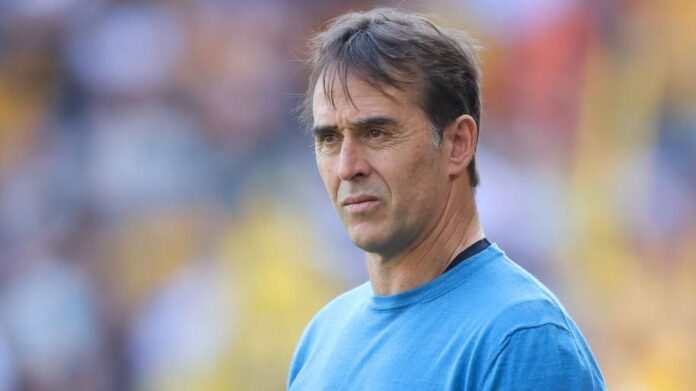In a surprising turn of events, Wolves have announced the departure of their current manager, Julen Lopetegui, just three days before the start of the Premier League season. The Spanish coach, who took over the helm in November, is set to leave the club, with both parties citing differences of opinion on key issues as the reason for the amicable split.
Lopetegui’s tenure at Wolves saw him guide the team from the bottom of the Premier League table to a respectable 13th-place finish. However, the club’s financial constraints and a shifting landscape seemed to have impacted his plans for the upcoming season. The Spanish manager had reportedly been led to believe that he would have the opportunity to strengthen the squad during the summer transfer window. But as the situation unfolded, those promises appeared to be altered, leading to a growing disconnect between him and the club’s decision-makers.
The departure comes after a successful pre-season, during which Lopetegui and his staff worked hard to prepare the team for the challenges ahead. However, behind-the-scenes conversations revealed a growing discord that culminated in the announcement of his exit. The departure extends to Lopetegui’s six-man backroom team, signaling a complete change in the coaching setup.
Wolves have moved quickly to secure a replacement, with former Bournemouth manager Gary O’Neil emerging as the front-runner. O’Neil, who managed to secure Bournemouth’s Premier League safety with a 15th-place finish last season, impressed the club’s hierarchy during the selection process. His appointment is expected to be confirmed in the coming days.

The abrupt change in leadership adds an element of uncertainty to Wolves’ preparations as they face Manchester United in their season opener. The departure of Lopetegui, a seasoned manager with experience at clubs like Real Madrid and Sevilla, is a loss for the club, leaving questions about the direction they will take under new leadership.
As fans and pundits speculate on the reasons behind Lopetegui’s departure, it’s clear that the clash of expectations and the financial constraints faced by the club have played a significant role. Lopetegui’s vision of bolstering the squad and aiming for a consistent top-10 finish, with ambitions for European competition, appears to have collided with the realities of the club’s financial obligations and transfer limitations.
Wolves’ chairman, Jeff Shi, addressed fans in an open letter, reaffirming the club’s commitment to its Chinese owners, Fosun, and the necessity of adhering to financial fair play rules. The club has had to make tough decisions, including the sale of key players, to ensure compliance with these regulations. The departure of Lopetegui is a reflection of the complex challenges faced by modern football clubs as they balance ambitions with fiscal responsibility.
Now, as Wolves look ahead to the start of the Premier League season with a new manager at the helm, the focus shifts to Gary O’Neil and his vision for the team. The abrupt departure of Lopetegui serves as a reminder of the intricate dynamics within football management, where the clash of expectations and financial realities can shape the course of a club’s journey. The upcoming season will provide insights into how Wolves navigate this transition and whether they can maintain their upward trajectory amidst these challenges.





